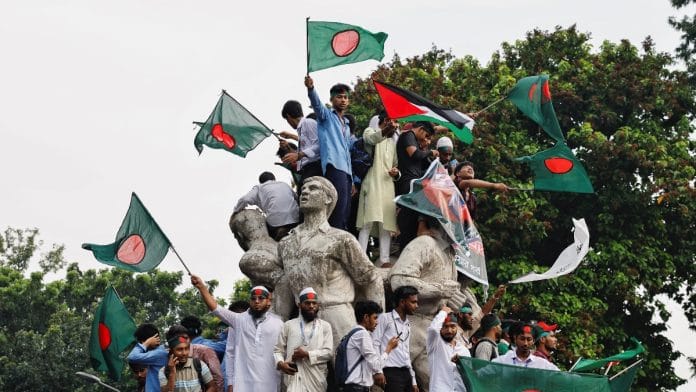The Hindu minority in Bangladesh has faced persecution historically, despite Sheikh Hasina’s effort to keep extremist Islamist elements in check. However, after the fall of her government, persecution of Hindus has significantly increased.
According to The Bangladesh Hindu Buddhist Christian Unity Council, more than 2,000 communal attacks on Hindus were reported between 4 to 20 August. This includes assaults on homes, businesses, and temples. Further, four reports of sexual assault have emerged, including one case of gang rape.
The authorities have failed to protect minorities and the world is finally taking note. During an urgent session of the British parliament, MP Priti Patel called the situation in Bangladesh “deeply, deeply concerning”.
Yunus evading accountability
Chief Adviser to Bangladesh’s interim government Muhammad Yunus has acknowledged the attacks on Hindus after Hasina’s fall but has denied the presence of anti–minority sentiment, calling the attacks politically motivated. Not only does this statement reflect a lack of statesmanship, it is dangerously close to denial and justification. It sends a perilous message to extremist elements within society, implying that targeting minorities can be excused under the guise of political conflict.
Yunus’ rhetoric mirrors the misuse of Pakistan’s blasphemy laws, which have long been weaponised to persecute minorities, and yet the use of such language by the leadership is tragic.
Apart from downplaying the anti-minority campaign against Hindus in Bangladesh, Yunus has also accused India of spreading rumours and undermining his government’s efforts to build a new Bangladesh. This deflection holds no water as credible reports of violence have emerged. Instead of addressing them, Yunus has chosen to shift the blame onto India, which appears to be a convenient way to evade responsibility.
The interim government must take an active stance in addressing the grievances of its minority communities. The arrest of Hindu monk Chinmoy Krishna Das—an activist protesting the atrocities on Hindus—under sedition charges, says everything about the state’s priorities.
The fact that Das has been unable to secure a lawyer for his defence speaks volumes about the pervasive anti-minority sentiment in Bangladesh. Although the court rejected a plea to ban ISKCON, its very existence highlights the ground reality. Notably, there are reports of ISKCON’s International Child Protection Office (ICPO) having imposed a ban on Das due to complaints.
It’s concerning to see videos of the Army dismantling CCTV cameras amid violence against Hindus in Chittagong, Bangladesh. Such incidences cast a harrowing shadow over the role of state institutions meant to safeguard all citizens. Where do minorities turn when those tasked with protecting them become a source of terror? It is saddening to feel alienated in your own country—to look at familiar uniforms that should represent security but instead symbolise fear.
Also read: Ajmer Dargah survey isn’t about righting historic wrongs. It’s an assault on Indian history
Learn from Pakistan’s trajectory
Bangladesh seems gripped by a wave of rising xenophobia and political enmity toward India—just like Pakistan. Some educational institutions in Bangladesh painted the Indian flag and ISKCON emblem on the floor and asked students to walk over them.
Children deserve a safe and unbiased environment to grow, learn, and form their own opinions. Teaching them to fear or hate those different from them plants seeds of division that grow into lifelong barriers to empathy and unity. It is not just a failure of the education system but a form of emotional abuse. It is truly disheartening to witness the weaponisation of innocence and negativity being served to impressionable minds.
While I am still hopeful for Bangladesh, I pray that instead of denying and deflecting, the government honours the country’s founding principles, paving the way for a harmonious and prosperous society. Bangladesh’s future will be defined by the values its current leadership upholds. One can only hope that the East Pakistan dream does not come true in modern-day Bangladesh.
As these troubling events unfold, Bangladeshi leadership and society must pause and think: Is this truly the path to a new Bangladesh? The country must look at Pakistan’s trajectory—marked by systemic discrimination, erosion of minority rights, and a fractured society—and make better decisions. A nation’s greatness is not measured by how it treats its majority, but by how it safeguards its minorities.
Amana Begam Ansari is a columnist. She runs a weekly YouTube show called ‘India This Week by Amana and Khalid’. She tweets @Amana_Ansari. Views are personal.
(Edited by Prasanna Bachchhav)







Bangladesh will become another Pakistan. My advice, India should offer asylum to the religious minorities and deport illegal Bangladeshis back to Bangladesh. And strengthen the border to deter terrorist infiltration. Consider working with China as they have good experience with successfully pacifying extremists elements and protecting their borders.
Who cares? If Bangladeshis wish to dig their own graves there is hardly anything India can do.
Reply to Mr. Ashok – that is not called banter but well orchestrated propaganda. Respectfully, it is foolish of you to take that word . Have you not read history of this nation and the current state of Pakistanis ? On the contrary the common sense line is – dekho bichadke wo Paak zameen wale kaise nikle ! They were meant to be the ones with “niyat” and look what their “niyati” landed them in !
For that matter, it wounds me when there is light hearted banter on social media, Pakistanis telling Indians, Tum bhi bilkul hamare jaise nikale.